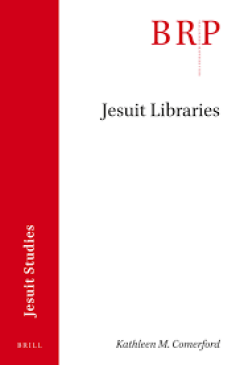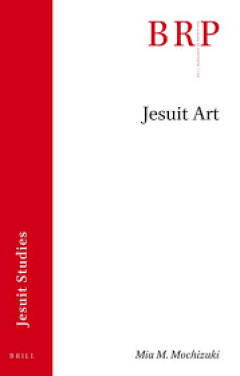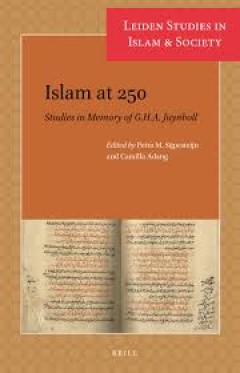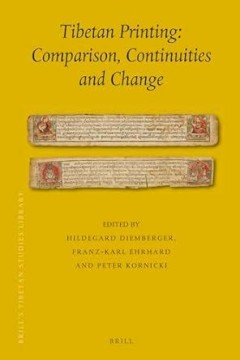Filter by

John Buridan Quaestiones super libros De generatione et corruptione Aristotel…
John Buridan (d. 1361) was one of the most talented and influential philosophers of the late Middle Ages. His fame extended far into the seventeenth century and underwent a revival in the twentieth century, when the French physicist Pierre Duhem rediscovered his manuscripts and wrote studies about them. So far, very few of Buridan's works have been edited. Two different questions commentaries o…
- Edition
- -
- ISBN/ISSN
- 978-90-04-18586-9
- Collation
- x, 270 pp.
- Series Title
- Medieval and Early Modern Philosophy and Science, Volume: 14
- Call Number
- -

Jesuits and Islam in Europe
This volume chronicles Jesuit efforts to engage with Muslim populations in Christian Europe, such as the Moriscos, as well as the work of Jesuit missionaries in Muslim territory, such as Constantinople. It provides insights into the activities of the Society of Jesus along the eastern frontier of the Ottoman Empire, and tracks the careers of individual Jesuits such as Tomás de León and Antoni…
- Edition
- -
- ISBN/ISSN
- 978-90-04-51731-8
- Collation
- viii, 116 pp.
- Series Title
- Brill Research Perspectives in Jesuit Studies
- Call Number
- -

Jesuit Libraries
The Society of Jesus began a tradition of collecting books and curating those collections at its foundation. These libraries were important to both their European sites and their missions; they helped build a global culture as part of early modern European evangelization. When the Society was suppressed, the Jesuits’ possessions were seized and redistributed, by transfer to other religious or…
- Edition
- -
- ISBN/ISSN
- 978-90-04-51737-0
- Collation
- vi, 115 pp.
- Series Title
- Brill Research Perspectives in Humanities and Social Sciences Brill Research Perspectives in Jesuit Studies
- Call Number
- -

Jesuit Art : Brill's Research Perspectives in Jesuit Studies
In Jesuit Art, Mia Mochizuki considers the artistic production of the pre-suppression Society of Jesus (1540–1773) from a global perspective. Geographic and medial expansion of the standard corpus changes not only the objects under analysis, it also affects the kinds of queries that arise. Mochizuki draws upon masterpieces and material culture from around the world to assess the signature str…
- Edition
- -
- ISBN/ISSN
- 978-90-04-49822-8
- Collation
- vi, 220 pp.
- Series Title
- Brill Research Perspectives in Humanities and Social Sciences Brill Research Perspectives in Jesuit Studies
- Call Number
- -

Jacopo Strada and Cultural Patronage at The Imperial Court (2 Vols.) : The An…
In Jacopo Strada and Cultural Patronage at the Imperial Court: Antiquity as Innovation, Dirk Jansen provides a survey of the life and career of the antiquary, architect, and courtier Jacopo Strada (Mantua 1515–Vienna 1588). His manifold activities — also as a publisher and as an agent and artistic and scholarly advisor of powerful patrons such as Hans Jakob Fugger, the Duke of Bavaria and t…
- Edition
- -
- ISBN/ISSN
- 978-90-04-35949-9
- Collation
- 2 Volumes (Vol. 1: xxvi, 544 pp.; Vol. 2: xiv, 525 pp.); 870 full-color illustrations
- Series Title
- Rulers & Elites, Volume: 17
- Call Number
- -

Islamic Reformism and Christianity : A Critical Reading of the Works of Muḥ…
No previous full-scale study has been undertaken so far to study the polemical writings of the Muslim reformist Muḥammad Rashīd Riḍā (1865-1935) and his associates in his well-known journal al-Manār (The Lighthouse). The book focuses on the dynamics of Muslim understanding of Christianity during the late 19th and the early 20th century in the light of al-Manār’s sources of knowledge, …
- Edition
- -
- ISBN/ISSN
- 978-90-47-44146-5
- Collation
- -
- Series Title
- The History of Christian-Muslim Relations, Volume: 12
- Call Number
- -

Islam at 250 : Studies in Memory of G.H.A. Juynboll
Islam at 250: Studies in Memory of G.H.A. Juynboll is a collection of original articles on the state of Islamic sciences and Arabic culture in the early phases of their crystallization. It covers a wide range of intellectual activity in the first three centuries of Islam, such as the study of ḥadīth, the Qurʾān, Arabic language and literature, and history. Individually and taken together, …
- Edition
- -
- ISBN/ISSN
- 978-90-04-42795-2
- Collation
- xxxviii, 374 pp.
- Series Title
- Leiden Studies in Islam and Society, Volume: 10
- Call Number
- -

Tradition and Power in the Roman Empire = Proceedings of the Fifteenth Worksh…
This volume focuses on the interface between tradition and the shifting configuration of power structures in the Roman Empire. By examining various time periods and locales, its contributions show the Empire as a world filed with a wide variety of cultural, political, social, and religious traditions. These traditions were constantly played upon in the processes of negotiation and (re)definitio…
- Edition
- -
- ISBN/ISSN
- 9789004537460
- Collation
- 356 hlm; ill., lamp.,
- Series Title
- Impact of Empire, Volume: 50
- Call Number
- -

Topographies of Tolerance and Intolerance = Responses to Religious Pluralism …
Topographies of Tolerance and Intolerance challenges the narrative of a simple progression of tolerance and the establishment of confessional identity during the early modern period. These essays explore the lived experiences of religious plurality, providing insights into the developments and drawbacks of religious coexistence in this turbulent period. The essays examine three main groups of a…
- Edition
- -
- ISBN/ISSN
- 9789004371309
- Collation
- 278 hlm; ill., lamp.,
- Series Title
- Studies in Central European Histories, Volume: 64
- Call Number
- -

Tibetan Printing: Comparison, Continuities, and Change
In Tibetan Printing: Comparisons, Continuities and Change the editors publish the results of the workshop “Printing as an Agent of Change in Tibet and beyond” held at Pembroke College, Cambridge, in November 2013. This is the first study of the social and cultural history of Tibetan book technology that takes materials, living traditions and cross-cultural comparisons into consideration. Br…
- Edition
- -
- ISBN/ISSN
- 9789004316256
- Collation
- 610 hlm; ill., lamp.,
- Series Title
- Brill's Tibetan Studies Library, Volume: 39
- Call Number
- -
 Computer Science, Information & General Works
Computer Science, Information & General Works  Philosophy & Psychology
Philosophy & Psychology  Religion
Religion  Social Sciences
Social Sciences  Language
Language  Pure Science
Pure Science  Applied Sciences
Applied Sciences  Art & Recreation
Art & Recreation  Literature
Literature  History & Geography
History & Geography